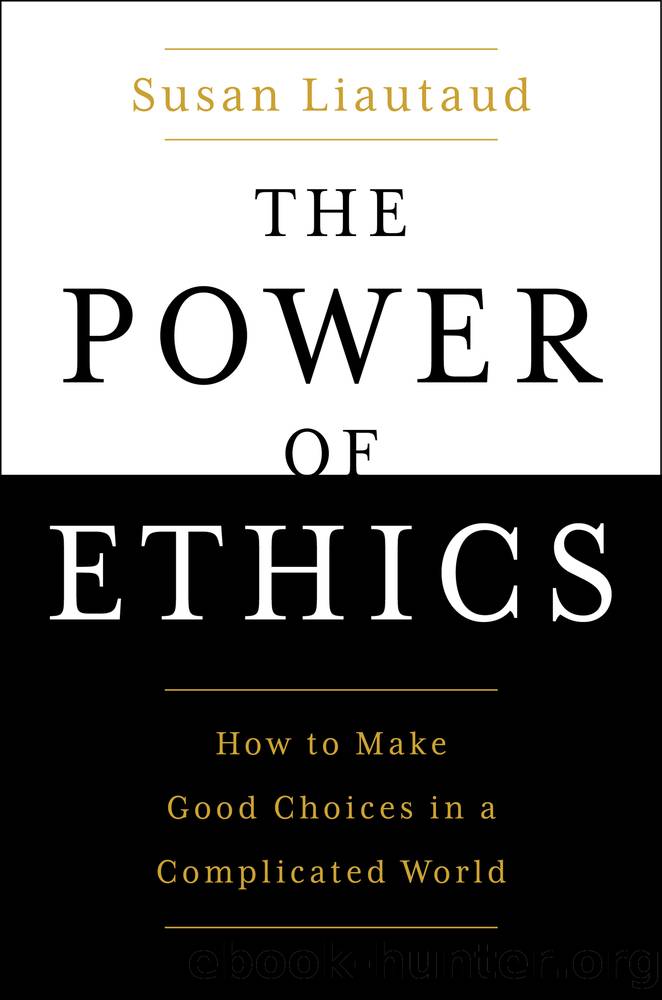The Power of Ethics: How to Make Good Choices in a Complicated World by Susan Liautaud

Author:Susan Liautaud [Liautaud, Susan]
Language: eng
Format: epub
Publisher: Simon & Schuster
Published: 2021-01-05T00:00:00+00:00
Ethics-on-the-fly scenario: What are the ethical stakes when parents refuse to vaccinate their children against measles and other diseases?
Although many health care decisions are not on the fly, in this case, we actually just need a little bit more information about vaccinations to make an ethical decision. In other words, we shouldnât assume we already have adequate, high-quality factsânor do we need to become medical experts. Our ethical analysis can be done on the fly, but it is still our responsibility to seek the relevant factual information by calling our physicians, a reputable health service hotline, or other respected health care sources. You should not, however, accept medical advice from a friend, religious leader, celebrity, social media platform, an unfamiliar website (even if it pops up near the top of a Google search), unaccredited nonprofit organization, or any unproven news source, just as you wouldnât consult a doctor for spiritual guidance or a journalist for plumbing help.
When it comes to vaccinations, compromised truth runs rampant. The many reasons why people who decline to vaccinate often dismiss scientific evidence. Some see vaccinations as a violation of their religious beliefs. Influential celebrities with no scientific expertise have publicly voiced their skepticism about the benefits and certainty about the harms. Some parents believe, with no foundation in fact, that a healthy lifestyle is enough to protect their children from disease.
Thankfully, in addition to your physicianâs advice, scientific facts can be found in one or two clicks online from trusted sources like the U.S. Centers for Disease Control and Prevention (CDC), the Mayo Clinic, the American Medical Association, and the World Health Organization. A few points about measles you would find in a matter of minutes include: Before the invention of the measles vaccine in 1963, an estimated three to four million Americans were infected each year. Up to five hundred died of the disease annually. In 2019, there were 1,282 cases of measles in the U.S. (the largest number since 1992), leading to 128 hospitalizations. According to the CDC, âthe majority of cases were among people who were not vaccinated against measles.â Though death from measles is relatively rare in the U.S. today, complications include ear and eye infections, pneumonia, and encephalitis (swelling of the brain).
The CDC describes measles as a âhighly contagious virusâ that can potentially be passed to others when an infected person coughs or sneezes, or by touching a contaminated surface. But with the help of a successful vaccination program, the U.S. declared the measles eliminated in 2000. A child who has received the recommended two doses of the measles, mumps, and rubella (MMR) vaccine (one between twelve and fifteen months; and another between four and six years) is believed to be 97 percent protected from the disease. Some parents genuinely believe that the vaccine will protect their children from measles, but might increase their risk of autism. Medical experts have debunked this theory. (In rare cases, children with certain medical conditions can face complications from vaccination; these instances where
Download
This site does not store any files on its server. We only index and link to content provided by other sites. Please contact the content providers to delete copyright contents if any and email us, we'll remove relevant links or contents immediately.
Tools of Titans by Timothy Ferriss(8396)
Change Your Questions, Change Your Life by Marilee Adams(7782)
Deep Work by Cal Newport(7083)
Playing to Win_ How Strategy Really Works by A.G. Lafley & Roger L. Martin(6306)
Man-made Catastrophes and Risk Information Concealment by Dmitry Chernov & Didier Sornette(6019)
Big Magic: Creative Living Beyond Fear by Elizabeth Gilbert(5771)
Digital Minimalism by Cal Newport;(5765)
Ego Is the Enemy by Ryan Holiday(5450)
The Slight Edge by Jeff Olson(5417)
The Motivation Myth by Jeff Haden(5212)
The Laws of Human Nature by Robert Greene(5208)
Stone's Rules by Roger Stone(5088)
Tuesdays with Morrie by Mitch Albom(4784)
Eat That Frog! by Brian Tracy(4540)
Rising Strong by Brene Brown(4459)
Skin in the Game by Nassim Nicholas Taleb(4248)
The Money Culture by Michael Lewis(4207)
Bullshit Jobs by David Graeber(4190)
Skin in the Game: Hidden Asymmetries in Daily Life by Nassim Nicholas Taleb(4007)
